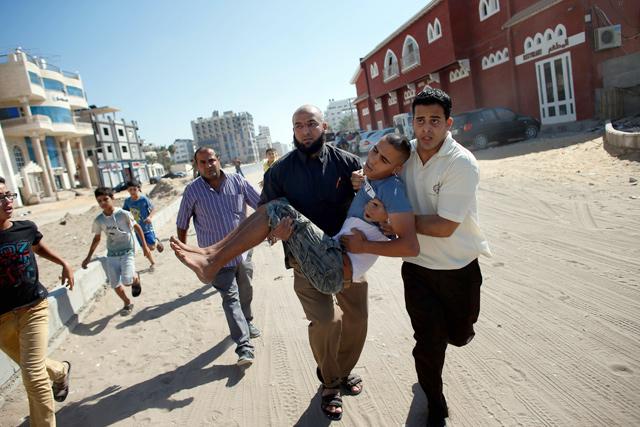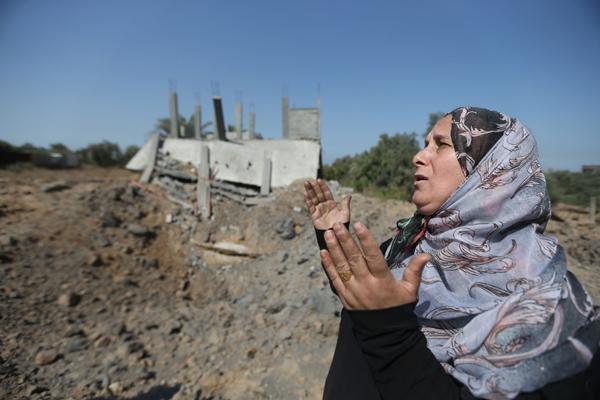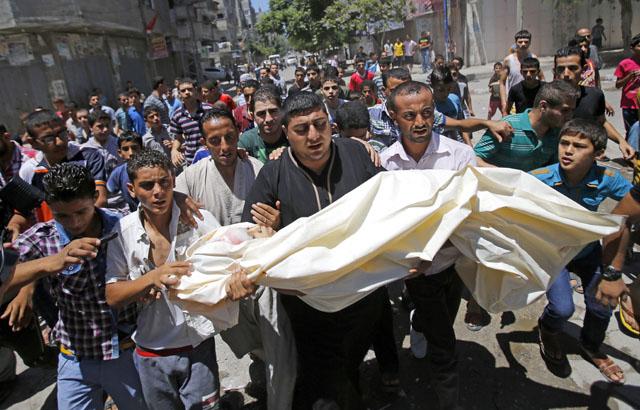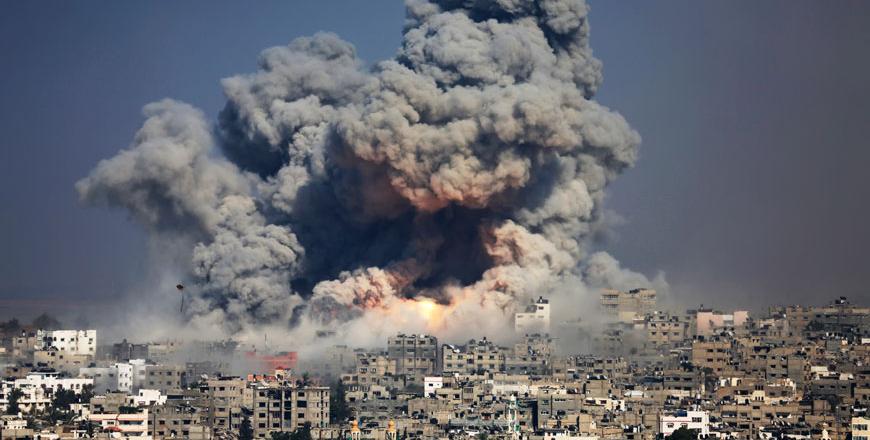You are here
Bereaved Gazans look to ICC for closure
By AFP - Feb 14,2021 - Last updated at Feb 14,2021

In this file photo taken on July 16, 2014, Palestinian employees of Gaza City’s Al Deira hotel carry a wounded boy following an Israeli strike nearby on the beach (AFP photo)
By Mai Yaghi
Agence France-Presse
GAZA CITY, Palestinian Territories — During the 2014 war in Gaza, Nevine Barakat lost her husband and saw three of her five children wounded in an Israeli bombardment of a school.
Today, she hopes the International Criminal Court (ICC) will finally bring them justice.
When the court ruled last week that it had jurisdiction in the Israeli-occupied Palestinian territories, opening the way for a war crimes investigation, Barakat immediately felt “happy and full of hope”.
“It was as if the world was beginning to understand that Israeli injustice had to be ended,” she told AFP, fighting back tears.
In the summer of 2014, Israel launched what it called Operation Protective Edge with the stated aim of stopping rocket fire into its territory by militants of Islamist movement Hamas.
The 50-day war in the Palestinian enclave was the third between the Jewish state and Hamas, after those of 2008 and 2012.
Around 2,250 Palestinians were killed in the 2014 fighting, mostly civilians, and 74 Israelis, mostly soldiers.
On July 30, 2014, Barakat and her family, like hundreds of others, were sheltering in a school run by the UN agency for Palestinian refugees (UNRWA) in Jabaliya, in the northern Gaza Strip.
Their homes had been destroyed in previous Israeli attacks.
A UN report said in the hours before dawn the school was hit by an Israeli artillery barrage.
“I counted seven shells before I passed out,” said Barakat, who suffered severe back injuries that left her paralysed in her lower limbs.
She said she only recovered conciousness when she heard her son cry out that his father was dead.
Her injured daughter Samar, now 18, remembers how she tried to dodge the shells.
“But they were falling in front of and behind us,” she said.
“Anyone who kills should receive his sentence, and Israel should be held responsible for its crimes.”
Death on the beach
A summary of a UN inquiry, published in April 2015, says four shells hit the school shortly after an unspecified explosion outside its walls.
It said that in the Jabaliya girls’ school shelling and six other incidents at UNRWA premises between July 8 and August 26, 2014, “at least 44 Palestinians were killed as a result of Israeli actions and at least 227 injured”.
“United Nations premises are inviolable and should be places of safety, in particular in a situation of armed conflict,” then-UN chief Ban Ki-moon wrote to the Security Council in a letter accompanying the report.
The Israeli forces said it had done everything possible to minimise casualties, accusing Gaza’s Hamas rulers and other armed groups of using civilians as “human shields” by firing from densely populated areas of the enclave of 2 million inhabitants.
The UN report acknowledged its inspectors found mortar tubes and rounds as well as “rockets” in some schools.
At another it “concluded that it was highly likely that an unidentified Palestinian armed group could have used the school premises to launch attacks”.
“The fact that they were used by those involved in the fighting to store their weaponry and, in two cases, probably to fire from them is unacceptable,” Ban wrote.
Outgoing ICC Prosecutor Fatou Bensouda said at the end of 2019 that she wanted to investigate possible “war crimes” in the Palestinian territories, after a preliminary examination opened in 2015 in the wake of the 2014 war.
Montasser Bakr, 17, says he is eager to testify to the court in The Hague if called upon.
“I will tell them, me, at the ICC, how my nine-year-old cousin Ismail was killed by Israel while he was going to get the ball!”
In July 2014, the boys were playing football at the beach when they were hit in an air strike.
Bakr was wounded, but his brother Zakaria and his three cousins, aged nine to eleven, were killed by the fire, which was witnessed by several foreign journalists.
The Israeli military launched an investigation then closed it saying that the “tragic” attack had not violated international law.
The incident is likely to be presented to the ICC as evidence of alleged Israeli war crimes if the accusations ever go to trial.
Bodies in the fridge
In November 2014, Amnesty International said Israeli strikes on Gaza in July and August targeted residential neighbourhoods without prior warning, killing 111 people.
It said at least 104 of the dead were civilians.
“Whole families, including many women and children, were killed or injured by these targeted strikes and, in addition, there was extensive destruction of civilian property,” it said.
Mohammad Abu Jazar, 34, lost his legs in a raid on his house in the southern Gaza town of Rafah, which claimed the lives of his wife and two of his children.
“We were sleeping when the strikes started,” he said.
On his phone is a picture that he says shows his children’s bodies in a fridge normally used to store ice cream.
Emergency teams had nowhere else to put their bodies after the raid as the mortuaries were all full, he said.
Related Articles
RAMALLAH, Palestine — Palestinian officials on Thursday welcomed delegates from the International Criminal Court (ICC) and said they hoped i
Cradling his baby daughter, Saeed Masri took flight Friday from renewed Israeli bombardment of Gaza with little faith that even a UN facility can protect his family.
GENEVA — Both Israel and Palestinian armed groups may have committed war crimes during last year's Gaza war, a widely anticipated United Nat

Opinion
Apr 09, 2025
Apr 08, 2025
- Popular
- Rated
- Commented
Apr 08, 2025
Apr 09, 2025
Newsletter
Get top stories and blog posts emailed to you each day.

















